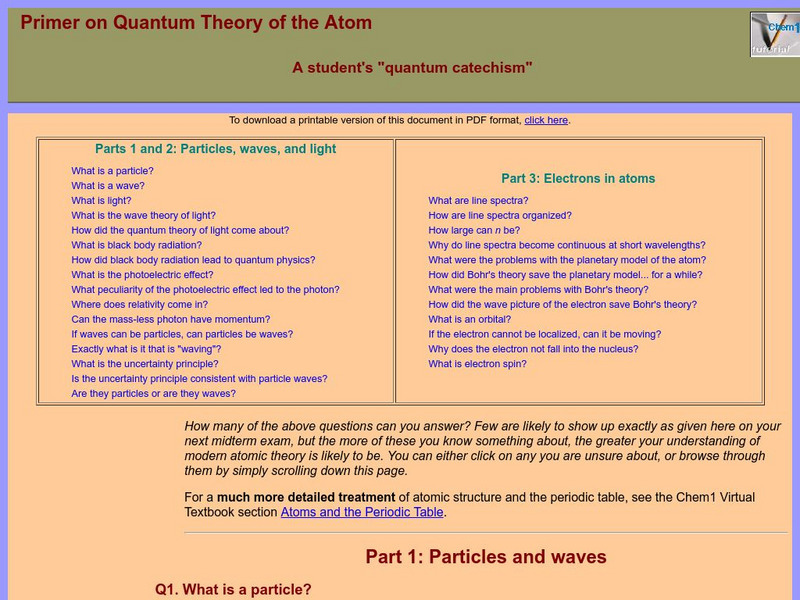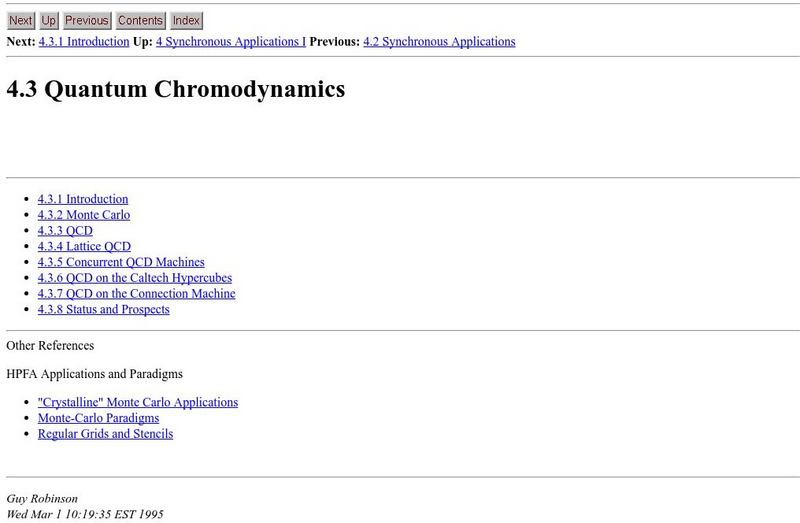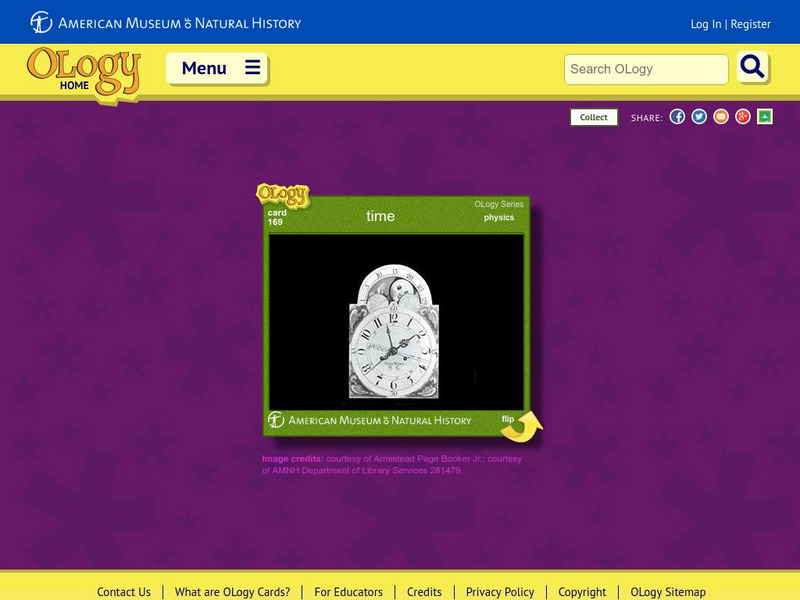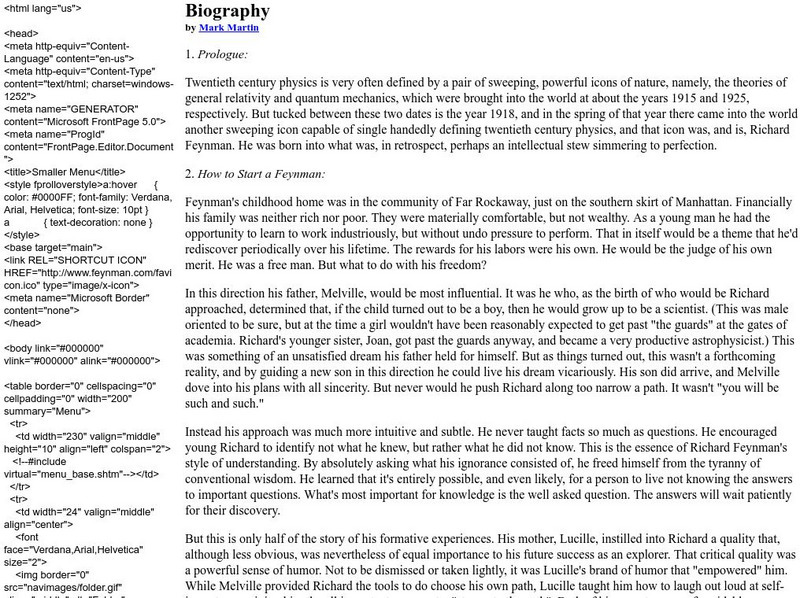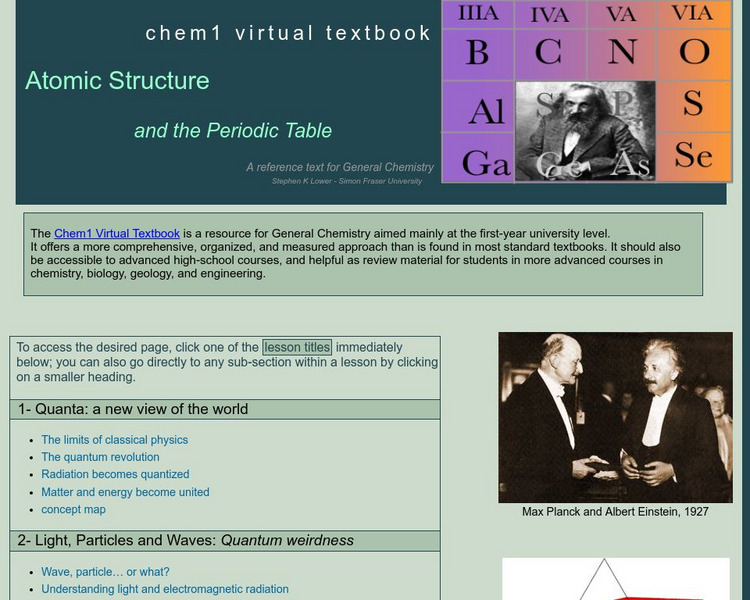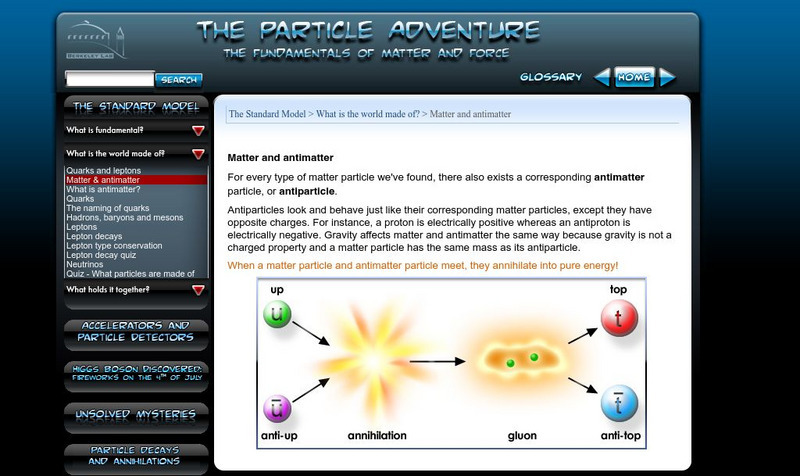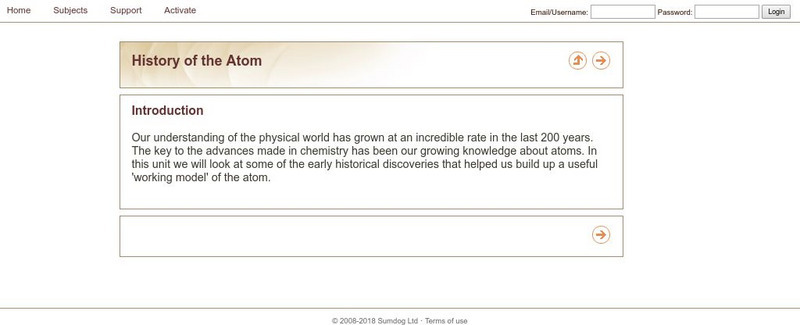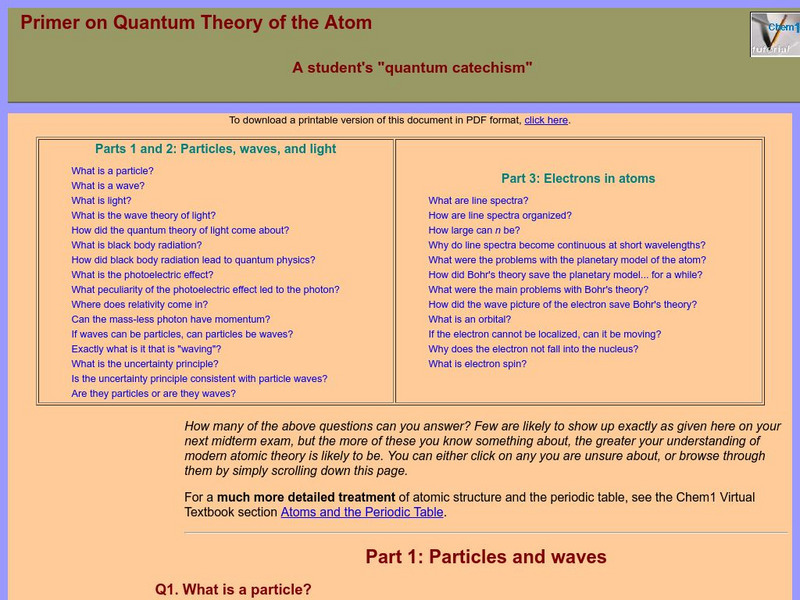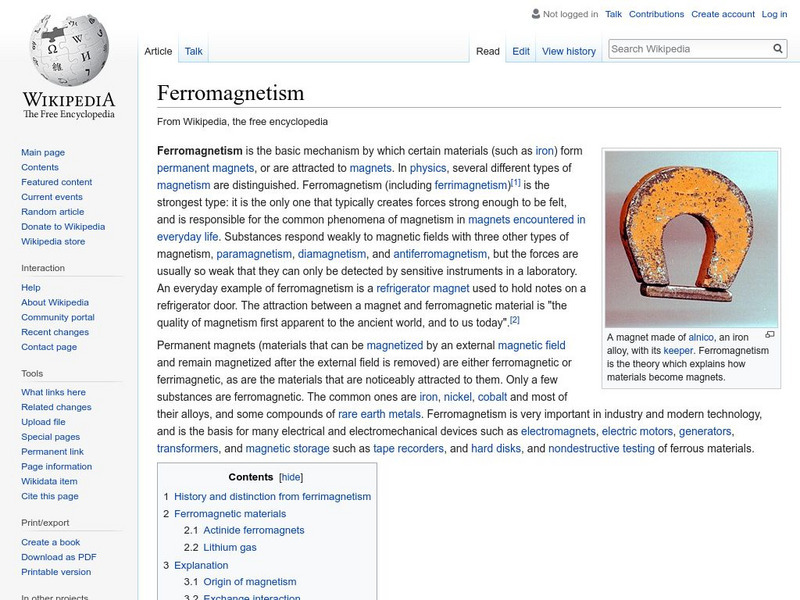Simon Fraser University
Chem1 Virtual Textbook: What Is an Orbital?
Acting as part of an overview on quantum theory, this section of the site deals with electrons and orbitals. In addition to explain what an orbital is, the site explains the movement of the electron in relation to the nucleus.
Nobel Media AB
The Nobel Prize: Niels Bohr Biographical
The Nobel Foundation provides this site about Niels Bohr's contributions to the world of physics, specifically his "investigation of the structure of atoms and of the radiation emanating from them." This biography includes information on...
Other
Netlib: 4.3 Quantum Chromodynamics
An online textbook containing an introduction to quantum chromodynamics (QCD). This is a proposed theory about what causes quarks and gluons to form hadrons. Article contains a description of lattice QCD, an approximation to QCD that is...
BBC
Bbc Mundo: El Ano Magico De Einstein
A special feature on Einstein from the BBC, in Spanish. Follow Einstein's life, including his role in the development of the atomic bomb; learn about the impact and practical applications of his work; or watch a speech he gave in 1950...
National High Magnetic Field Laboratory
Magnet Academy: Enrico Fermi
Enrico Fermi was a titan of twentieth-century physics. He outlined the statistical laws that govern the behavior of particles that abide by the Pauli exclusion principle and developed a theoretical model of the atom in his mid-twenties....
American Museum of Natural History
American Museum of Natural History: Time O Logy Card
Flip over this interactive OLogy card to find short overviews, fact-or-fiction questions, and similar bite-size bits of information about the nature of time, time travel, atomic clocks, and the general theory of relativity.
Other
Biography of Richard Feynman
This biography of the physicist Richard Feynman surveys his contributions to the development of the atomic bomb as well as his work on quantum electrostatics.
Famous Scientists
Famous Scientists: Aage Bohr
Learn about the life of Aage Niels Bohr, and see how his work was pivotal in the development of the theory of the structure of the atomic nucleus.
National High Magnetic Field Laboratory
Magnet Academy: Edward Purcell
Edward Mills Purcell was an American physicist who received half of the 1952 Nobel Prize for Physics for his development of a new method of ascertaining the magnetic properties of atomic nuclei. Known as nuclear magnetic resonance...
Chem4kids
Chem4 Kids: Atoms: Orbitals
The website provides an explanation of the electrons' position in their orbitals as they spin around the nucleus. Quantum theory is also explored by explaining that the exact location of a specific electron is a not exact but a guess.
Other
Erik's Chemistry Page: Electronic Structure of Atoms
A description of quantum theory, the Bohr model of the atom, the quantum mechanical atom, the Scrodinger equation, and quantum numbers.
Exploratorium
Exploratorium: Cern: Antimatter
A wonderfully written non-technical introduction to antimatter, as well as a brief discussion of the investigation into the asymmetry between the quantities of matter and antimatter observed in our universe.
NASA
Nasa: Reaching for the Stars
Find the latest news on research and development underway to use antimatter as a fuel for space vehicles. (April 12, 1999)
Simon Fraser University
Chem1 Virtual Textbook: Atoms and the Periodic Table
As part of the General Chemistry Virtual Textbook, this site examines a list of related topics (in hyperlink format) on the atom and the Periodic Table of elements. Topics from light, particles, and waves to the Bohr model, quantum...
Lawrence Berkeley National Laboratory
Berkeley Lab: Particle Adventure: Matter and Antimatter
The beginning of an informative tutorial on antimatter, covering quarks, hadrons, baryons, mesons, leptons, and neutrinos.
American Association for the Advancement of Science
Fermilab Physicists Find New Matter Antimatter Asymmetry
This complicated yet interesting article describing the discovery of asymmetry between the behavior of matter and antimatter.
Other
Ippog: Hands on Particle Physics
Looking for more insight into particle physics? Search among several general particle physics resources. Or locate a specific particle physics institute in your area of the world.
CK-12 Foundation
Ck 12: Flex Book Textbooks: Chemistry Second Edition
[Free Registration/Login may be required to access all resource tools.] A complete, web-based, multi-media textbook covering a wide variety of Chemistry concepts.
Nobel Media AB
The Nobel Prize: J. J. Thomson Biographical
Read this detailed Nobel E-Museum biography which includes information on the scientific world of Joseph John Thomson, which gained world-wide recognition and earned Thomson the Nobel Prize in Physics.
American Chemical Society
Middle School Chemistry: Protons, Neutrons, and Electrons
Investigate why a charged object is attracted or repelled by another charged object. Explore the concept that the attraction between positive protons and negative electrons holds an atom together.
Other
Cronodon: Atoms Models of the Atom
Presents models of the atom developed by Thomson, Rutherford, Bohr, and Schrodinger. Includes successes and failures of each, illustrations, and detailed descriptions. Also discusses Dirac's model of the atom and introduces quantum...
Other
Crocodile Clips: Absorb Chemistry: History of the Atom
A tutorial that presents models of the atom proposed by John Dalton, J.J. Thomson, Ernest Rutherford, and Niels Bohr. Each is supported by an animated illustration. Includes comprehension questions and a quiz at the end.
Simon Fraser University
Chem1 Virtual Textbook: What Is Light?
Acting as part of an overview on quantum theory, this section of the site answers the question, what is light? In answering the question, specific discussion is directed toward light waves and theories of light.
Wikimedia
Wikipedia: Ferromagnetism
This site from Wikipedia provides a wonderful in-depth explanation of ferromagnetism, covering the atomic behavior which is responsible for ferromagnetic properties. Also introduces the concepts of magnetic domains and the Curie...


